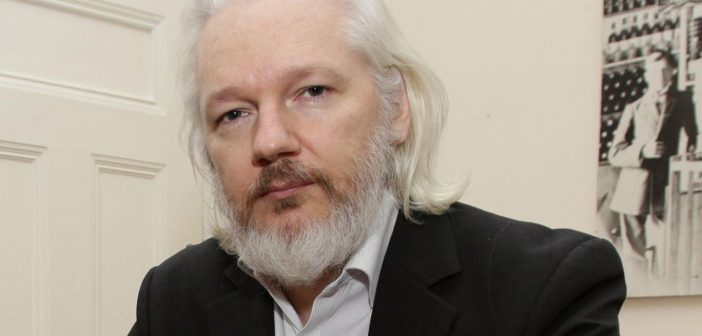Critical theorist Walter Benjamin, it was, who pointed out that ‘There is no document of civilisation which is not at the same time a document of barbarism.’
Considering that the slow motion execution of Julian Assange, who’s currently languishing in London’s Category A Belmarsh Prison, is taking place at the behest of a British legal system whose adherents boast is a pillar of Western civilisation, Benjamin’s observation is well made.
Because be in no doubt, the founder and former editor of Wikileaks, the publishing organisation which since established in 2006 has removed the cloak of democracy from the face of an empire whose high crimes and war crimes would make Genghis Khan blush, has been placed on a metaphorical cross at in the name of nothing more ennobling than vengeance and retribution.
The chilling warning that Assange could die in the prison unless he receives urgent medical treatment — a warning published in the Guardian in the form of an open letter signed by more than 60 doctors — should make every person of conscience and consciousness tremble with rage. Compounding his brutal treatment is the knowledge that he is not being forced to suffer in the name of British justice, but instead in the name of British subservience to Washington.
In this regard the British state is acting like a rogue state, evincing no respect for international law or human rights, much less basic human decency.
Don’t just take my word for it either. Nils Melzer, the UN Special Rapporteur on Torture, after visiting Assange at Belmarsh recently, voiced strong concerns over the conditions of his detention, arguing that ‘The blatant and sustained arbitrariness shown by both the judiciary and the Government in this case suggests an alarming departure from the UK’s commitment to human rights and the rule of law. This is setting a worrying example, which is further reinforced by the Government’s recent refusal to conduct the long-awaited judicial inquiry into British involvement in the CIA torture and rendition programme.’
Added to the revelation that while confined in the Ecuadorian Embassy between 2012 and 2019, where he’d sought political asylum fearing extradition to the US, Julian Assange was secretly being spied on by a Spanish defence and private security company at the behest of US intelligence — the revelation that the husband of the judge presiding over his extradition to the US until recently, Lady Emma Arbuthnot, has financial links to the UK military establishment, ‘including institutions and individuals exposed by Wikileaks’ — and you have a case that is so sordidly corrupt that it is no hyperbole to assert, as precisely the aforementioned Nils Melzer did in an article back in June, that ‘this is not only about protecting Assange, but about preventing a precedent likely to seal the fate of Western democracy.’
Julian Assange, in his role as editor of Wikileaks, has been the canary down the coal mine of this very ‘Western democracy’, exposing the rank hypocrisy, lies, exceptionalism, and barbarity that are embedded in its foundations. For so doing he’s now being forced to endure the kind of punishment that even Kafka couldn’t conjure up.
Expanding on this literary theme, it was American novelist Thomas Wolfe who in his essay ‘God’s Lonely Man’ argued that loneliness is the universal yet unspoken fate of all in society. He wrote: “The whole conviction of my life now rests upon the belief that loneliness, far from being a rare and curious phenomenon, is the central and inevitable fact of human existence.”
The concept of the isolation and loneliness of the individual in society is one that has been explored continuously. In literature Albert Camus’ seminal work The Stranger, also titled The Outsider (1942), describes the alienation of the novel’s protagonist, Meursault, before, during and after he kills a man in self defence. In first person narrative, the reader is introduced to Meursault being notified of his mother’s death. He attends the wake but refuses to view the body when offered the chance. Later he attends the funeral, but does so absent of any of the conventional emotions associated with bereavement. When standing trial for killing the man in self defence, he likewise betrays no emotion, as if passively accepting his fate.
Meursault’s crime in the eyes of society isn’t so much that he killed a man, but that he demonstrated no emotion or remorse either in the aftermath or before when attending to his mother’s death. This lack of emotion bespeaks a refusal to conform, an abnormality, thus marking him out as a threat to the system and its moral verities.
Taken in context then, Julian Assange has provided the world with a glimpse of an empire in decline. More, he has provided it with a warning of the grim consequences if, like Camus’s Meursault, it remains passive in the face of the crimes and violations of human rights it commits on a daily basis in a desperate and cynical attempt to maintain its fading hegemony.
It is why at this moment, languishing in Belmarsh Category A Prison in London, the founder of Wikileaks is indeed God’s Lonely Man.
Thus, it is the duty of all who believe in truth and justice to end his loneliness and with one voice demand his release. For if Julian Assange is allowed to perish in prison not only will we be indicted in the court of history, like him we may well find ourselves indicted in the court of those who speak the language of democracy while practising the law of the jungle.

